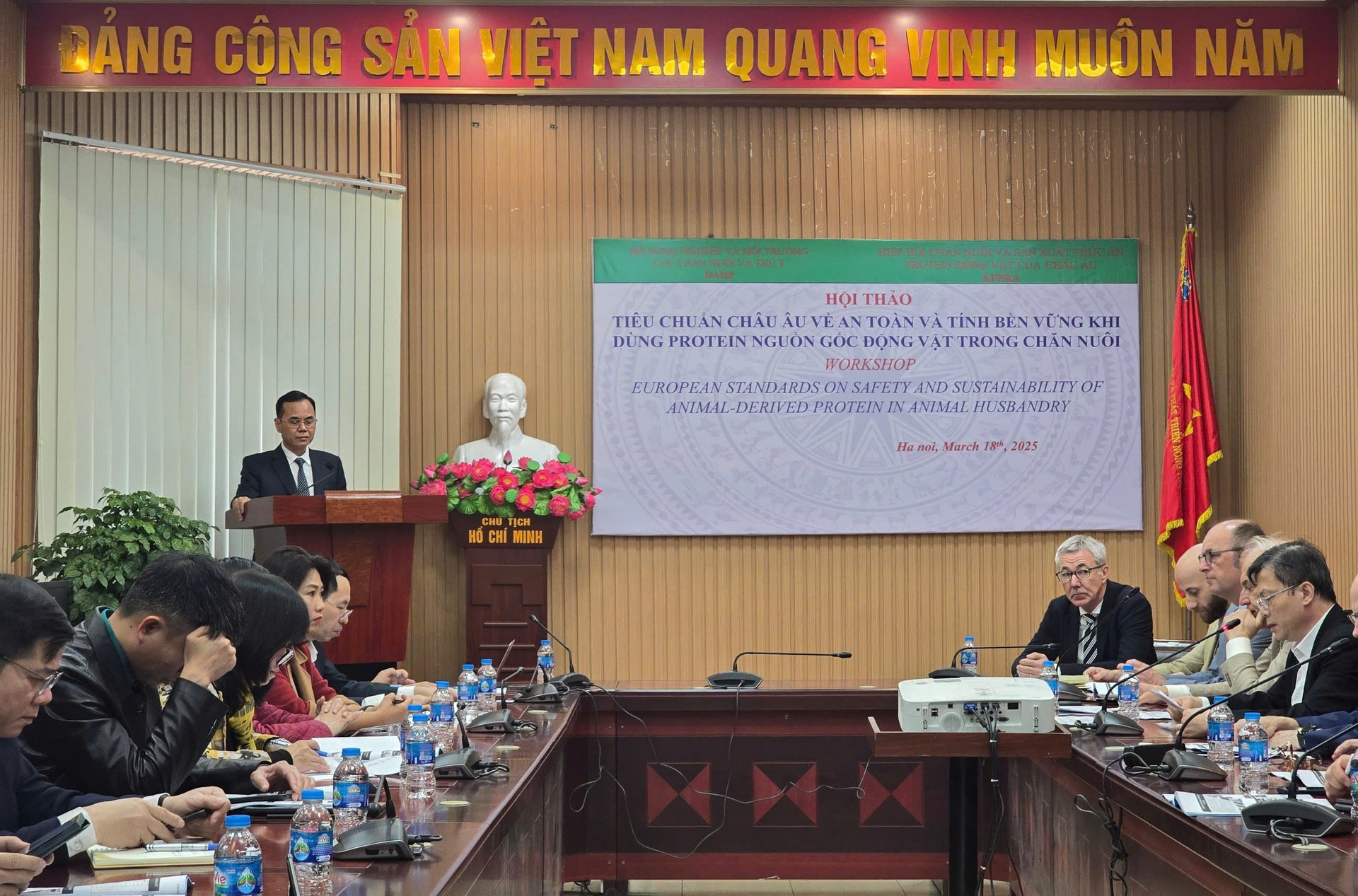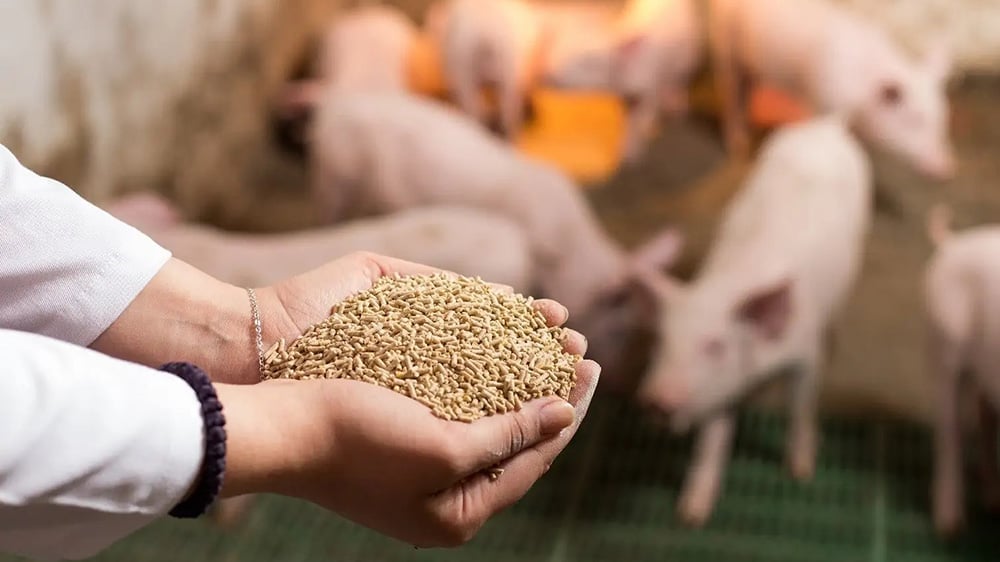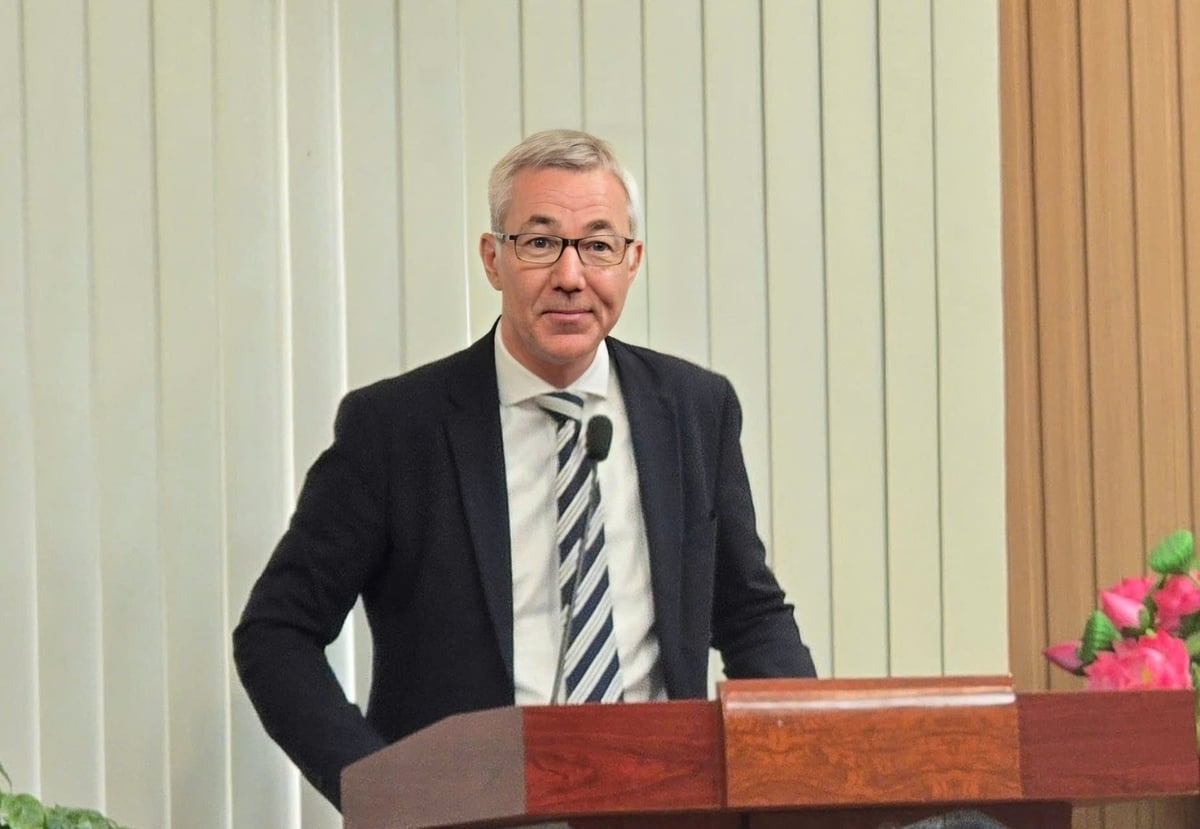December 2, 2025 | 07:13 GMT +7
December 2, 2025 | 07:13 GMT +7
Hotline: 0913.378.918
December 2, 2025 | 07:13 GMT +7
Hotline: 0913.378.918

Mr. Pham Kim Dang, Deputy Director of the Department of Animal Husbandry and Veterinary Medicine, spoke at the Workshop. Photo: Linh Linh.
The European Fat Processors and Renderers Association (EFPRA) and the Department of Livestock Production and Veterinary Medicine (under the Ministry of Agriculture and Environment) collaborated to organize a seminar on European standards for the use of animal-derived protein in livestock feed on the morning of March 18.
Mr. Pham Kim Dang, the Deputy Director of the Department of Livestock Production and Veterinary Medicine, emphasized the livestock sector's accomplishments during his presentation at the seminar. Nevertheless, he also recognized a number of persistent obstacles, such as environmental contamination, disease outbreaks, small-scale production, food safety concerns, and slaughterhouse control.
Although Vietnam is the eighth-largest producer of animal feed in the world, it is still significantly reliant on imported raw materials, with over 65% of its feed ingredients sourced from abroad, totaling over $7.5 billion in 2024. There were nearly $300 million in imports of animal-based feed ingredients, with the majority of these imports originating from Europe. The European Union has granted authorization to more than 1,000 enterprises to export animals and animal products to Vietnam.
Mr. Dang underscored that the utilization of slaughterhouse and processing by-products to mitigate waste and environmental contamination is one of the most urgent issues of the present day. The collection and recycling procedure is still limited, particularly in small-scale slaughterhouses, despite the fact that over 2.5 million tons of by-products are generated annually, primarily from pigs and poultry. At present, industrial slaughtering is responsible for only 10-12% of all slaughtered poultry and livestock, suggesting that there is substantial potential for development in this industry.
In the areas of technology transfer, administration, and the safe and sustainable recycling of animal by-products, EFPRA has the capacity to assist Vietnam with its 250 processing plants. This presents a critical opportunity for Vietnam's livestock industry to enhance long-term sustainability, reduce dependence on imported raw materials, optimize value-added processes, and develop a circular economy model.

With more than 2.5 million tons of by-products each year, mainly from pigs and poultry, collection and recycling are still limited, especially from small slaughterhouses. Photo: LL.
Mr. Robert Figgener, President of the European Fat Processors and Renderers Association (EFPRA), stated that the seminar offered the association the chance to impart its knowledge and experience to Vietnam. He emphasized that EFPRA is aware of Vietnam's livestock development plans and perceives lots of collaboration opportunities to assist in the realization of these objectives.
Domestic animal feed production is one of Vietnam's primary concerns, which involves the use of slaughter by-products. Currently, Vietnam's slaughterhouses have conducted primitive assessments of the volume of by-products generated. EFPRA, on the other hand, has modern processing systems that could assist Vietnam in the efficient use and recycling of these raw materials.

Mr. Robert Figgener, Chairman of EFPRA, shared at the workshop. Photo: Linh Linh.
Mr. Figgener emphasized the importance of meetings and information exchanges between the two parties in order to promote cooperation in this field. EFPRA is prepared to extend an invitation to Vietnamese experts to Europe in order to provide them with an introduction to the operation and transportation of slaughter by-products, as well as the processing and preservation methods, and factory construction processes, in accordance with the highest standards.
Mr. Figgener emphasized that, in the near future, it would be advantageous to capitalize on slaughter by-products, in addition to utilizing plant-based feed ingredients, in light of Vietnam's abundant animal feed production.
This method not only enhances the utilization of domestic raw materials but also promotes the sustainable development of livestock within a circular economy model. Furthermore, he stated that EFPRA maintains meticulous and stringent requirements for the processing of animal feed, with 35% of its annual production being exported to overseas markets.
Mr. Dirk Dobbelaere, Secretary General of EFPRA, underscored the fact that Europe implements rigorous safety regulations for the generation of animal-derived protein for livestock feed. This protein must be processed completely from the by-products of healthy animals that have been slaughtered for human consumption, in accordance with regulations, to prevent any potential dangers to the health of humans, animals, or the environment. Products used to feed fish and other aquatic species are also subject to these standards.
Mr. Dobbelaere claimed that processed animal-derived protein is never generated from by-products that have not been subjected to risk assessment, food refuse, sludge, dirty fats, or dead livestock. Furthermore, the production process rigorously forbids the use of raw materials that contain banned substances or permitted compounds that exceed allowable limits.
In addition to addressing critical challenges such as global population growth, shrinking land resources, and increasing constraints on raw material availability due to climate change and urbanization, the use of processed animal-derived protein also supports sustainable livestock husbandry. Mr. Dobbelaere underscored that this is also a trend that must be considered in order to optimize the use of by-products in animal feed, reduce food waste, and conserve natural resources.
According to EFPRA’s calculations, animal-derived protein from pigs and poultry has the potential to reduce global warming impacts 4.1 to 4.6 times more effectively than soybean meal and is up to 7.6 times more sustainable than feather meal.
Translated by Dieu Linh

(VAN) The large-scale agroforestry investment project aims to develop a leading sustainable agro-industrial center in Angola.
/2025/11/28/3433-1-212821_213.jpg)
(VAN) Many localities across the coconut land of Vinh Long are replicating emission-reducing models in production and daily life, contributing to the targets for emission reduction and green economic development.

(VAN) The green transition is an inevitable path for collective economy to achieve balanced growth and align with global trends.

(VAN) The TH Group is not only Vietnam’s leading clean-milk producer; it is also leaving a strong mark on sustainable development as it pursues the goal of carbon neutrality.
/2025/11/27/3830-1-152901_403.jpg)
(VAN) Dong Nai is developing its key crop areas, expanding planting area codes, and applying high technology to increase the value of agricultural products, aiming at a green and sustainable agriculture.

(VAN) Tay Ninh’s livestock sector is undergoing a major transformation, applying high-tech, closed-loop circular models to build sustainable value chains.
/2025/11/26/3627-4-082628_818.jpg)
(VAN) From a small café on the red basalt highlands, Le Van Hoang started a business with clean coffee, building Enjoi Coffee into a symbol of organic agriculture in the Lam Dong plateau.